
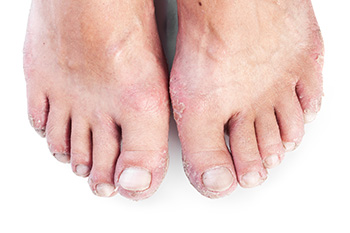
Psoriatic arthritis, or PsA, often leads to pain and swelling in the feet. Treatment includes supportive footwear and medication. Symptoms vary, with pain intensifying during flare-ups and reducing during remission. Proper footwear offers protection and support, and specialized insoles can enhance this support. PsA can alter toenails, so regular podiatric care is vital. Medication plays a significant role, with options ranging from NSAIDs for pain relief to biologics targeting the immune system. Regular check-ups ensure optimal treatment. If you suffer from the effects of psoriatic arthritis in your feet, it is strongly suggested that you make an appointment with a podiatrist for personalized treatment that will help you experience relief.
Arthritis can be a difficult condition to live with. If you are seeking treatment, contact Dr. Edward D. Hutson from Easton, PA. . Our doctor can provide the care you need to keep you pain-free and on your feet.
Arthritic Foot Care
Arthritis is a term that is commonly used to describe joint pain. The condition itself can occur to anyone of any age, race, or gender, and there are over 100 types of it. Nevertheless, arthritis is more commonly found in women compared to men, and it is also more prevalent in those who are overweight. The causes of arthritis vary depending on which type of arthritis you have. Osteoarthritis for example, is often caused by injury, while rheumatoid arthritis is caused by a misdirected immune system.
Symptoms
Arthritic symptoms range in severity, and they may come and go. Some symptoms stay the same for several years but could potentially get worse with time. Severe cases of arthritis can prevent its sufferers from performing daily activities and make walking difficult.
Risk Factors
If you suspect your arthritis is affecting your feet, it is crucial that you see a podiatrist immediately. Your doctor will be able to address your specific case and help you decide which treatment method is best for you.
If you have any questions, please feel free to contact our offices located in Easton, and Northampton, PA . We offer the newest diagnostic and treatment technologies for all your foot care needs.
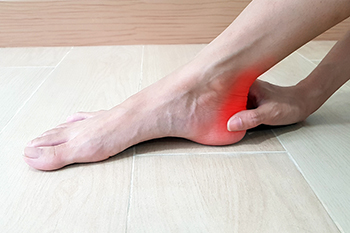
The Achilles tendon, a robust band of tissue connecting the calf muscles to the heel bone, plays a pivotal role in our ability to walk, run, and jump. However, this vital structure is not invincible. Achilles tendon injuries can be painful and debilitating. They often result from overuse, sudden changes in physical activity, or inadequate warm-up routines. Strains, characterized by mild to severe discomfort, may be a sign of overexertion or minor tears in the tendon. In contrast, a complete rupture, often accompanied by a sudden, sharp pain and a popping sensation, is a more severe injury requiring immediate medical attention. The road to recovery varies depending on the injury's extent, with treatments ranging from rest for minor strains to surgical intervention for more severe cases. If you experience an Achilles tendon injury, it is strongly suggested that you schedule an appointment with a podiatrist who can determine what the correct treatment is for you.
Achilles tendon injuries need immediate attention to avoid future complications. If you have any concerns, contact Dr. Edward D. Hutson of Easton, PA. . Our doctor can provide the care you need to keep you pain-free and on your feet.
What Is the Achilles Tendon?
The Achilles tendon is a tendon that connects the lower leg muscles and calf to the heel of the foot. It is the strongest tendon in the human body and is essential for making movement possible. Because this tendon is such an integral part of the body, any injuries to it can create immense difficulties and should immediately be presented to a doctor.
What Are the Symptoms of an Achilles Tendon Injury?
There are various types of injuries that can affect the Achilles tendon. The two most common injuries are Achilles tendinitis and ruptures of the tendon.
Achilles Tendinitis Symptoms
Rupture Symptoms
Treatment and Prevention
Achilles tendon injuries are diagnosed by a thorough physical evaluation, which can include an MRI. Treatment involves rest, physical therapy, and in some cases, surgery. However, various preventative measures can be taken to avoid these injuries, such as:
If you have any questions please feel free to contact our offices located in Easton, and Northampton, PA . We offer the newest diagnostic tools and technology to treat your foot and ankle needs.
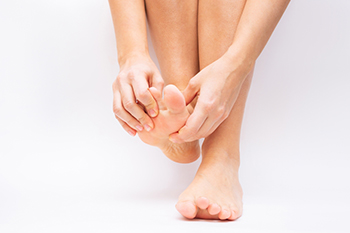
Big toe arthritis, also known as hallux rigidus, is a condition that can cause significant discomfort and limitation in mobility. In the initial stage of big toe arthritis, patients may experience mild pain when bending the great toe joint. This discomfort might start as a dull ache, but pain may gradually intensify as the joint warms up. Some individuals may notice slight warmth and swelling after physical activity. As the condition progresses, the range of motion in the affected joint decreases due to cartilage loss. In advanced stages, the joint may become nearly immobile. Bone spurs and calcifications around the joint cause it to appear bulkier, leading to discomfort when wearing shoes. Some patients may experience a burning sensation, numbness, or tingling in the toe due to pressure on skin nerves between bone spurs and shoe wear. Definitive diagnosis of big toe arthritis requires standing X-rays of the feet. While X-rays don't directly show cartilage, they reveal narrowing or loss of joint space, bone spurs, and bone erosions, all indicative of arthritis. If you're experiencing persistent toe pain or suspect big toe arthritis, it is suggested that you make an appointment with a podiatrist for an accurate diagnosis and appropriate treatment plan.
Toe pain can disrupt your daily activities. If you have any concerns, contact Dr. Edward D. Hutson of Easton, PA. . Our doctor can provide the care you need to keep you pain-free and on your feet.
What Causes Toe Pain?
Most severe toe pain is caused due to a sports injury, trauma from dropping something heavy on the toe, or bumping into something rigid. Other problems can develop over time for various reasons.
Toe pain can be caused by one or more ailments. The most common include:
When to See a Podiatrist
Diagnosis
In many cases the cause of toe pain is obvious, but in others, a podiatrist may want to use more advanced methods to determine the problem. These can range from simple visual inspections and sensation tests to X-rays and MRI scans. Prior medical history, family medical history, and any recent physical traumatic events will all be taken into consideration for a proper diagnosis.
Treatment
Treatments for toe pain and injuries vary and may include shoe inserts, padding, taping, medicines, injections, and in some cases, surgery. If you believe that you have broken a toe, please see a podiatrist as soon as possible.
If you have any questions please feel free to contact our offices located in Easton, and Northampton, PA . We offer the newest diagnostic tools and technology to treat your foot and ankle needs.
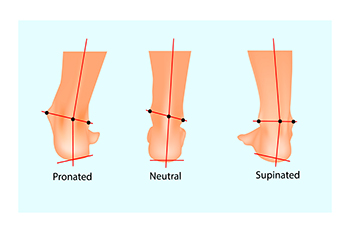
Overpronation is a common foot condition that can have a significant effect on your feet as well as your overall health. This malady occurs when the arches of the feet collapse excessively inward while walking or running. While some degree of pronation is normal, overpronation can lead to various issues. One of the most noticeable effects of overpronation is pain and discomfort. The excessive rolling of the foot can cause strain on the arches, leading to arch and heel pain. It can also contribute to problems in other body parts, such as shin splints, knee pain, and lower back pain as the misalignment in the feet affects the lower body's alignment. Over time, untreated overpronation can lead to more serious issues, including bunions, plantar fasciitis, and Achilles tendonitis. It also may be connected to development of hammertoes and Morton’s neuroma. Fortunately, podiatrists can provide solutions like custom orthotics and exercises to help alleviate the effects of overpronation and prevent further complications. If you suspect you may have overpronation issues, it is suggested that you make an appointment with a podiatrist for a gait evaluation and discussion on whether custom orthotics may be needed to keep your feet healthy and pain-free.
If you have any concerns about your feet, contact Dr. Edward D. Hutson from Easton, PA. . Our doctor can provide the care you need to keep you pain-free and on your feet.
Biomechanics in Podiatry
Podiatric biomechanics is a particular sector of specialty podiatry with licensed practitioners who are trained to diagnose and treat conditions affecting the foot, ankle and lower leg. Biomechanics deals with the forces that act against the body, causing an interference with the biological structures. It focuses on the movement of the ankle, the foot and the forces that interact with them.
A History of Biomechanics
Modern technological improvements are based on past theories and therapeutic processes that provide a better understanding of podiatric concepts for biomechanics. Computers can provide accurate information about the forces and patterns of the feet and lower legs.
Understanding biomechanics of the feet can help improve and eliminate pain, stopping further stress to the foot.
If you have any questions please feel free to contact our offices located in Easton, and Northampton, PA . We offer the newest diagnostic and treatment technologies for all your foot and ankle needs.
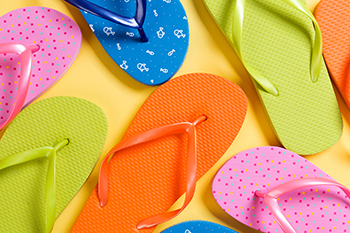
Flip-flops are popular summer footwear, offering ease and comfort on hot days. However, while they may be the preferred choice for many, it is essential to understand how they can affect your feet. The primary concern with flip-flops is their lack of support. They typically offer minimal arch support, and the thin sole provides little cushioning. This can lead to overuse injuries such as plantar fasciitis and Achilles tendonitis, as well as discomfort and fatigue during extended wear. Many flip-flops also have a lack of protection. Flip-flops expose your feet to hazards such as sharp objects, extreme heat, or slippery surfaces. This can result in cuts, burns, or accidents. Additionally, flip-flops often require a gripping motion of the toes to keep them in place, potentially leading to strain or imbalance in the foot's muscles. While flip-flops are perfect for short, casual outings, they should not be your primary footwear choice for long walks or activities that demand proper foot support and protection. Choosing shoes with better arch support and cushioning can help safeguard your feet against potential discomfort and injuries. If you would like more information about the negative effect wearing flip-flops can have on your feet, it is suggested that you speak with a podiatrist.
Flip-flops can cause a lot of problems for your feet. If you have any concerns about your feet or ankles, contact Dr. Edward D. Hutson from Easton, PA. . Our doctor will assist you with all of your foot and ankle needs.
Flip-Flops and Feet
Flip-flops have managed to become a summer essential for a lot of people. While the shoes may be stylish and easy to slip on and off, they can be dangerous to those who wear them too often. These shoes might protect you from fungal infections such as athlete’s foot, but they can also give you foot pain and sprained ankles if you trip while wearing them.
When Are They Okay to Wear?
Flip-flops should only be worn for very short periods of time. They can help protect your feet in places that are crawling with fungi, such as gym locker rooms. Athlete’s foot and plantar warts are two common fungi that flip-flops may help protect your feet against.
Why Are They Bad for My Feet?
These shoes do not offer any arch support, so they are not ideal for everyday use. They also do not provide shock absorption or heel cushioning which can be problematic for your feet. Additionally, you may suffer from glass cuts, puncture wounds, and stubbed toes since they offer little protection for your feet.
More Reasons Why They Are Bad for Your Feet
If you have any questions, please feel free to contact our offices located in Easton, and Northampton, PA . We offer the newest diagnostic and treatment technologies for all your foot care needs.